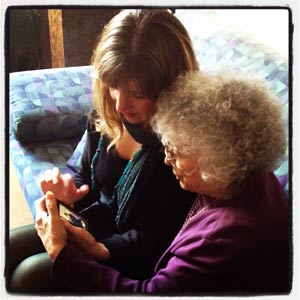
According to the Pew Research, approximately 10 million boomers are concurrently raising children and providing support to aging parents.
This is not a unique situation. There are approximately 35 million Americans over 65 years of age, and this number is projected to double by 2030. According to Money Magazine, the fastest growing segment of the total population is made up of adults over 85.
And according to the Pew Research, approximately 10 million boomers are concurrently raising children and providing support to aging parents. Herein lies the problem. The growth in the number of baby boomers over 65 is not keeping up with the increase in the population of adults over 85, meaning that the need for caregivers is on the rise and those in the sandwich generation are struggling to keep up with this demand.
 As a geriatric nurse practitioner, I encounter this situation – and the sandwich generation – on a routine basis. The older parent often is 85 or over and brought to the office for a geriatric assessment by the adult child. According to the National Alliance for Caregivers, more than 65 million people (29%) provide care to the chronically ill.
As a geriatric nurse practitioner, I encounter this situation – and the sandwich generation – on a routine basis. The older parent often is 85 or over and brought to the office for a geriatric assessment by the adult child. According to the National Alliance for Caregivers, more than 65 million people (29%) provide care to the chronically ill.
These caregivers are traditionally female children attempting to work, manage households, balance their marriages, and care for their children. Typically, the parent is experiencing cognitive decline, weight loss, poor hygiene, or frequent falls.
The adult child is frustrated because she does not know how to handle the changes observed in the parent and often does not have enough time to spend with the parent because of her own children’s needs. This leaves the adult child with little time or energy for herself.
However, by having the family present at the appointment, the practitioner is able to identify problems or concerns that can help map out possible interventions. One of the major objectives here is to keep the older adult safe in his or her environment, but practitioners also need to help the older adult child find a balance in her life to decrease stress.
 There is a sense of comfort and satisfaction as a practitioner in being able to introduce the proper resources needed to help the aging parent and diminish the stress of the adult child. Some of the common resources include home health care, social services, legal services, and proper ongoing medical care. By identifying problems and needs early on, the adult child will find it much easier to survive the sandwich generation.
There is a sense of comfort and satisfaction as a practitioner in being able to introduce the proper resources needed to help the aging parent and diminish the stress of the adult child. Some of the common resources include home health care, social services, legal services, and proper ongoing medical care. By identifying problems and needs early on, the adult child will find it much easier to survive the sandwich generation.
Bonnie is a guest blogger to HRB — Bonnie Guith Is a gerontological nurse practitioner. She has practiced in the field for over 15 years in southeastern michigan. She holds a bachelors of science from Nazareth College as well as a master’s of science in nursing from the University of Michigan and is certified as a gerontological nurse practitioner.


Leave a Reply